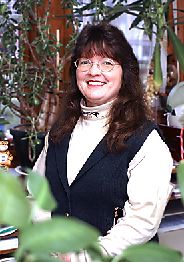P E O P L E
Spotlight
Name: Robin Pispecky.
Position: Financial assistant in the Department of Geosciences. Managing the administrative and operational accounts for the department. Assisting the department manager with special projects. Approving purchases orders and vouchers. Processing hourly employees.
Quote: ''There's a great group of people here, and you're meeting new people all the time -- graduate and undergraduate students, staff and faculty. It exposes you to a lot of different cultures.''
Other interests: Singing in the music ministry programs at the Jacobstown Baptist Church. Riding and showing horses. Raising orchids and other indoor plants.
Briefs
Professor Alan Krueger has been selected as a fellow of the American Academy of Political and Social Science.
The academy was founded in 1889, and began publishing The Annals in 1890. In 2000, the academy established the fellows program to recognize and honor individual social scientists for their distinguished scholarship in the social sciences and efforts to communicate that scholarship to an audience beyond their own discipline.
Krueger, the Lynn Bendheim Thoman, Class of 1976, and Robert Bendheim, Class of 1937, Professor in Economics and Public Policy, has been a Princeton faculty member since 1987. His primary research and teaching interests are labor economics, education, industrial relations and social insurance. Since March 2000, he has written a monthly column on economics for The New York Times.
Arthur Brooks, an engineer at the U.S. Department of Energy's Princeton Plasma Physics Laboratory, is this year's PPPL Distinguished Engi-neering Fellow.
The PPPL recognized Brooks for "outstanding engineering accomplishments in the areas of electromagnetic, thermal-hydraulic and structural analysis for numerous experimental devices and design studies, including the Tokamak Fusion Test Reactor, the Tokamak Physics Experiment and the National Spherical Torus Experiment." He also was cited for pioneer- ing the development of electromagnetic codes that were pivotal in the design of the National Compact Stellarator Experiment.
Fellows receive one-time gifts of $5,000 and qualify for priority in regard to their research and engineering programs.
|
|


Contents
|

